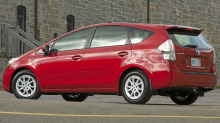Toyota's Prius V: V is for versatile
 Diesel or hybrid? That is the question. And it’s more relevant than ever.
Diesel or hybrid? That is the question. And it’s more relevant than ever. Fuel prices aren’t going down, folks, not in any significant way. Never. More likely they are going up, up and up.
As The Globe’s Eric Reguly pointed out earlier year, the Saudis have essentially set a floor price for a barrel of oil and it’s $100 (U.S.). More likely, a barrel of oil is going to stay in the $120-$150 (U.S.) range. If trouble breaks out in any oil-supplying nation or nations, or if the global economy picks up, or both, then $200 (U.S.) seems reasonable.
Pain at the pump aside, government regulators have decided that fuel economy is going to be the order of the day, no matter how much auto analyst Dennis DesRosiers rails against the inanity of politicians trying to force car buyers into teeny, weeny vehicles that cannot hope to meet their real-world needs.
Small may be beautiful in cell phones, but wee cars are a nightmare if you have a hockey bag in your life or something like it, or if you’re a taxi driver faced with loads of curbside luggage.
Some of us need a vehicle with space for more than a family of ants. This explains the 2012 Prius v ($27,200), which is what you might call the station wagon version of the Prius hatchback. The latter, if you believe the reliability research from Consumer Reports, is the top “green car” and the former easily tops the wagon class.
The closest diesel rival? That would be the Volkswagen Golf wagon, the 2.0 TDI version that starts at $27,025. The Golf diesel is a fuel sipper (6.7 litres/100 km in the city, 4.6 highway) and its 236 lb-ft of torque is absolutely truck-like.
The Prius v, however, is thriftier still: 4.3 city/4.8 highway and, while the combined 134 hp of the gasoline-electric power train does not sound impressive on the surface because an electric motor is at work here, off-the-line performance is quite okay.
So now we come to the hybrid-versus-diesel question. Obviously, the hybrid’s fuel efficiency is dramatically superior. If the federal government’s EnerGuide numbers are correct, the Prius v will cut your annual fuel bill by nearly 40 per cent compared to the Golf TDI ($966 versus $1,334 for its average driver). If greenhouse gas emissions matter to you, the Prius v puts out only about two-thirds the carbon dioxide (2,116 kg/year versus 3,132 kg/year of the Golf TDI).
As an environmental transportation play, the Prius v is hands-down superior to the Golf diesel. Of course, there are other reasons to opt for a diesel over a hybrid, not least of which is long-term durability. But do remember that the Prius has topped CR’s reliability charts for as long as the David Suzukis of the world have been buying them – some three million worldwide in all.
Now that Toyota has a crossover wagon Prius for sale, four million on the road can’t be far off. Why Toyota waited until now to deliver a crossover Prius is something of a mystery, but who cares? The 2012 Prius v provides more cargo space than 80 per cent of all small SUVs, not to mention 40 percent more cargo volume than the standard Prius. Size matters.
And the Prius does a perfectly good job of keeping up with traffic, too. No, it’s not as peppy as the Golf diesel and you really get the message when you’ve loaded up with cargo and crew, or you’re going up a steep hill. The VW never feels underpowered, while the Prius v is working.
The different transmissions have an impact on performance, also. Volkswagen has a slick six-speed DSG automated double-clutch manual transmission (with Sport and Manual modes). The shifts come quickly and seamlessly and they feel sporty. The driver is connected here.
The Prius v, on the other hand, has a continuously variable transmission (CVT). A CVT puts economy before performance and that’s a good thing if you want economy above all else. At highway speeds, the Prius v is guilty of a constant-rpm drone and, at times, power delivery has a “rubber-band”-like feel. None of this is particularly off-putting, but it’s not for the enthusiast, either.
Nonetheless, Toyota has made huge strides forward in making its hybrids ride and handle in a pleasing way. Steering, braking, cornering – well, the Prius v has steering that feels natural and the ride quality is superior to any other Prius. The Golf TDI wagon is a more refined and confident performer, however, and there are other crossovers – the 2013 Mazda CX-5 comes to mind – which are more entertaining to drive, also.
More than anything, the Prius v is a thoroughly practical fuel-sipper, one with a relatively small CO2 footprint and plenty of space for you, others and stuff. If you want a hybrid that makes sense, right down to the hatchback opening at the rear, this is it.
You can return to the main Market News page, or press the Back button on your browser.

